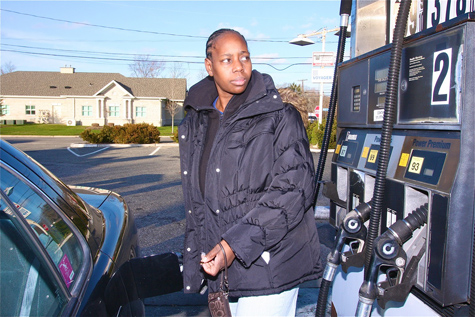County lawmakers repeal tax cap on gasoline

When Pete D’Ancona pulled into the Valero gas station on Main Road in Cutchogue Friday afternoon, it was the second time that day he’d fueled his truck, used to haul commercial construction waste from various locations across Long Island.
“I already put in $100 this morning,” Mr. D’Ancona said as the meter stopped at about $75 for nearly 18 gallons of diesel fuel.
When told that the Suffolk County Legislature agreed last week to repeal its tax cap on gasoline priced over $3 per gallon, which could mean higher prices at the pump, Mr. D’Ancona had a one-word reaction.
“Unbelievable,” he said.
Mr. D’Ancona said he will continue to absorb rising fuel costs because he won’t pass it onto his customers.
“I’ll have to pay it,” he said. “If I can’t pay for the fuel, then I can’t move my trucks.”
During its Dec. 6 meeting, lawmakers approved a bill introduced by Presiding Officer William Lindsay’ (D-Holbrook) to repeal the county’s sales tax cap on wholesale gasoline. The wholesale price of gasoline is about 20 cents less than the retail price.
Currently, the county’s 8.6 percent sales tax is applied only to wholesale gasoline priced under $3. For example, if gas is $3.50 per gallon, the wholesale price is about $3.30. The 30 cents over $3 is exempt from county tax. If the new legislation is approved, the repeal will eliminate that exemption.
Should the Lindsay bill pass, drivers could pay 2 to 3 cents more per gallon at the pump, adding up to about $5 per week for an average household.
That might not seem like a lot to some, but it’s too much for Valerie Allen of Freeport, a mother of six who has family in Riverhead.
“Every penny counts nowadays,” Ms. Allen said while fueling up on Friday at the at the OK Petroleum gas station in Riverhead. “I’m already driving less often because gas is so expensive.”
A spokesman for Mr. Lindsay said the county has lost about $2.5 million in revenue since the tax cap was implemented earlier this year.
But because data recently compiled by Mr. Lindsay’s office shows that oil distributors, not consumers, have benefited from the tax cap on gasoline, many Democratic Legislators supported repealing the gas tax cap.
The bill passed 10 to 7, with all Republican Legislators, as well as Democrat Lou D’Amaro, voting in opposition. Democratic Legislator Ricardo Montano was absent from the vote.
County Executive Steve Levy is expected to veto the bill, which isn’t “veto-proof” because the Legislature didn’t pass it with the 12 votes needed to override.
This isn’t the first time the Legislature has attempted to repeal the gas tax cap.
In October, county lawmakers proposed rolling it back in order to pay the out-of-county state community college tuition tax. But the move failed last month when updated gas price estimates showed that the county would generate only about $7 million by rolling back the fuel tax. That wouldn’t cover the $10.5 million to $12 million tuition tax and would ultimately create a multimillion dollar hole in the budget.
North Fork Legislator Ed Romaine (R-Center Moriches) said he voted against the bill because it did not include a specific plan for how the extra revenue generated by the gas tax will be spent.
“You can’t hit the taxpayer anymore,” he said. “[The tax cap on gasoline] gives them a few more pennies in their pocket. It’s about $5 per week for an average size of family of four. It’s not a lot, but many would say it’s better in the family’s pocket than in the county’s pocket.”
In addition to burdening families, the legislation would also have a detrimental effect on the farming community, said Mr. Romaine.
From running tractors to irrigation systems, all farmers factor in the cost of diesel fuel when totaling their production expenses.
Joe Gergela, executive director of the Long Island Farm Bureau, said that although rising fuel costs burden farmers in different ways, he doesn’t predict farmers will pass the increases to consumers.
“Any kind of increase in doing business just makes it harder on farmers,” he said.
Mike Acebo, manager of Brewer Yacht Yard in Greenport, said he’s already seen the effect of rising fuel costs in his marina.
“A lot of boaters are reducing the number of trips they take or are just staying at the dock instead,” he said.
In a weekend, some boaters already spend between $400 and $500 on fuel, consuming between 10 and 20 gallons an hour, Mr. Acebo said.
To ease some of that burden, he said his company offers a preferred customer card that gives boaters discounts on gas. When told by a reporter about the proposed gas tax cap repeal bill, Mr. Acebo said he hopes the county will reconsider.
“[High fuel costs] make it harder on our customers and make it harder on us,” he said. “We’d hate to see people not boat.”





